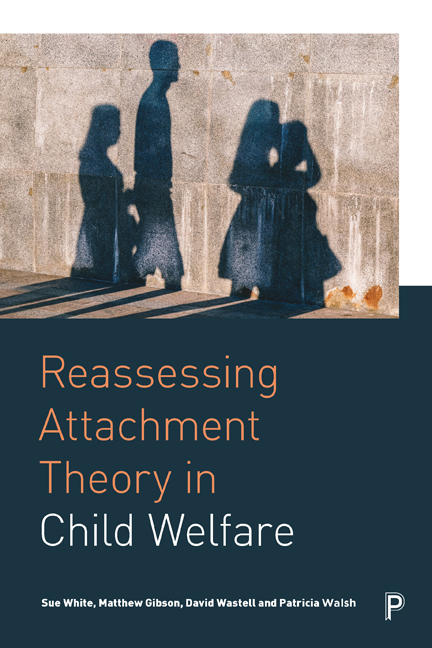Book contents
- Frontmatter
- Contents
- List of Figures, Table and box
- About the Authors
- Acknowledgements
- Preface: Becoming Attached to Attachment Theory
- 1 Love is a Wondrous State: Origins and Early Debates
- 2 Social work and the Attachment Story: a Felicitous Bond?
- 3 Shaping Practice: Prescribing Assessment
- 4 Practising Attachment Theory in Child Welfare
- 5 Exhibiting Disorganised Attachment: not even Wrong?
- 6 Breaking the back of love: Attachment Goes Neuro-Molecular
- Coda: love Reawakened?
- References
- Index
4 - Practising Attachment Theory in Child Welfare
Published online by Cambridge University Press: 23 February 2021
- Frontmatter
- Contents
- List of Figures, Table and box
- About the Authors
- Acknowledgements
- Preface: Becoming Attached to Attachment Theory
- 1 Love is a Wondrous State: Origins and Early Debates
- 2 Social work and the Attachment Story: a Felicitous Bond?
- 3 Shaping Practice: Prescribing Assessment
- 4 Practising Attachment Theory in Child Welfare
- 5 Exhibiting Disorganised Attachment: not even Wrong?
- 6 Breaking the back of love: Attachment Goes Neuro-Molecular
- Coda: love Reawakened?
- References
- Index
Summary
And then I see it, altogether, in one pure thought bite; the Quantity Theory of Insanity shows its face to me. I suppose all people who look for the first time upon some new, large scale, explanatory theory must feel as I did at that moment. With one surge of tremendous arrogance, of aching hubris, I felt as if I were looking at the very form of whatever purpose, whatever explanation, there really is inherent in the very stuff of this earth, this life … ‘What if …’ I thought to myself, ‘What if there is only a fixed proportion of sanity available in any given society at any given time?’ … For years I had sought some hypothesis to cement the individual psyche to the group; it was right in front of me all the time. But I went on, I elaborated, I filled out the theory, or rather it filled out itself. It fizzed and took on form the way a paper flower expands in water. (Self, 1991, p 126)
The above quote is taken from a satirical novel about psychiatry by Will Self, an English journalist and novelist. Like all satire, it exaggerates and amplifies, but for its power it relies on the recognisability of its subject matter. If it is too far removed from what we think we know, satire ceases to be funny. Thus, the author makes a serious point about the effect that theory has on our perception of reality and about theory's capacity to feed itself. Child welfare professions are concerned with human relationships and emotion and thus they must rely to a large extent on exoteric, practical-moral reasoning. However, we must consider the effect of theory on such reasoning.
The following two extracts from a family law case illustrate the impact of an expert psychological assessment of the mother, based, it would seem, on one episode of observation and a single diagnostic interview.
Extract 1
Dr Hall then described the benefits of secure attachment and made reference to recent advances in neuroscience indicating the impact on the development of a baby's brain as a result of the attachment process.
Information
- Type
- Chapter
- Information
- Reassessing Attachment Theory in Child Welfare , pp. 63 - 82Publisher: Bristol University PressPrint publication year: 2019
